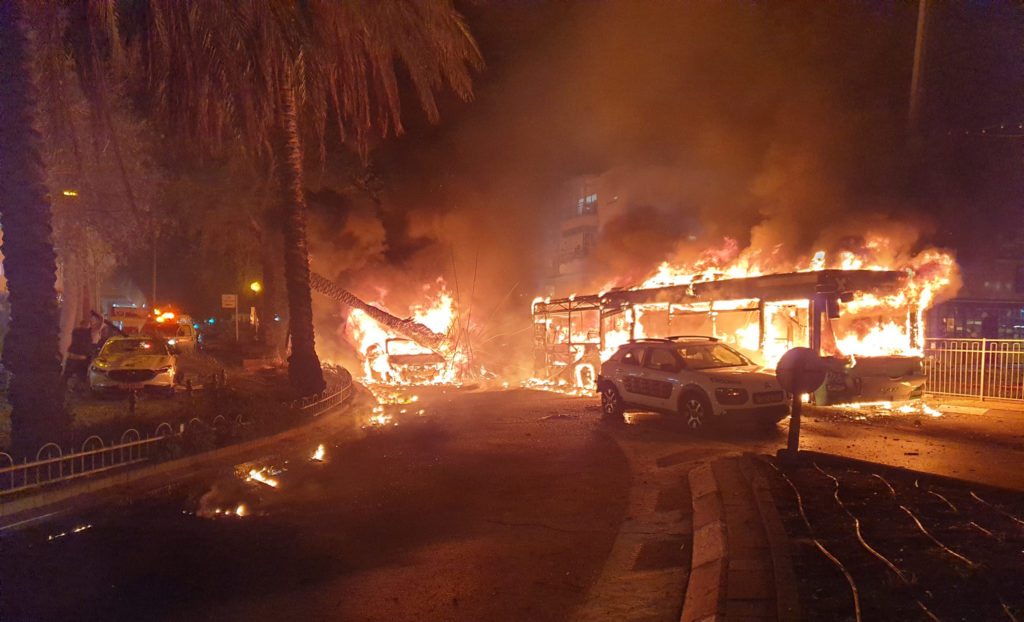Australia/Israel Review
Editorial: Gaza reveals Iran sanctions relief danger
May 28, 2021 | Colin Rubenstein

The massive barrage of some 4,350 rockets launched between May 10 and May 21 by Hamas and other Iranian-sponsored terror groups from Gaza toward Israeli cities should serve as a wake-up call to Western negotiators in Vienna. The talks there to bring the US and Iran back into compliance with the 2015 JCPOA nuclear deal are very relevant to what happened in Israel and Gaza.
Back in 2019, even under crippling sanctions, Iran reportedly increased its funding to Hamas to US$30 million a month. That funding would surely be vastly increased should Iran be rewarded with large-scale sanctions relief, as the Vienna negotiators are reportedly preparing to do.
Iran’s Gaza funding is not intended to address the humanitarian needs of Palestinians but rather to assist Hamas and Palestinian Islamic Jihad to develop as many military-grade rockets, drones, incendiary balloons and other military assets as possible, including fortified bunkers, rocket launchers and tunnels, all deliberately placed in civilian urban areas. This emboldens these terror organisations and callously and cruelly places innocent Gazans in danger as human shields.
Neither Hamas nor Iran make any effort to hide this military and strategic partnership. Rather, they celebrate it. On May 21, senior Hamas leader Ismail Haniyeh offered his “thanks and gratitude to those who gave money and weapons to the valiant Resistance, the Islamic Republic of Iran, who were generous and provided the Resistance with money, weapons and technology.”
Once, Iran primarily smuggled rockets to Gaza by sea or through tunnels from Sinai. Stymied by countermeasures taken by Egypt and Israel, in recent years it has shifted its focus to training Gazans in missile construction, while providing blueprints and parts.
Haniyeh also revealed the widespread Western presumption that Hamas merely reacted to supposed Israeli provocations in Jerusalem to be a complete fallacy. “This battle has destroyed the project of ‘coexistence’ with the Israeli occupation, of the project ‘normalisation’ with Israel,” he said, revealing Hamas’ real motives – to undermine the Abraham Accords between Israel and Arab states and to drive a wedge between Israel’s Jewish and Arab populations.
Furthermore, two weeks before the escalation, Palestinian Media Watch reported a major surge in incitement to violence by both Fatah and Hamas as part of an attempt to burnish their credentials as “defenders of Jerusalem” ahead of an election for the Palestinian Authority that was ultimately cancelled.
As in previous rounds of violence, Hamas attacked Israel after apparently calculating that whatever price it would pay militarily would be offset by the vilification of Israel in the global media and online. Too many supposedly sophisticated journalists and commentators fail to grasp the cynical way asymmetric terror warfare makes the imbalance of power work to the advantage of those who employ it. Instead, they default to a morally bankrupt assumption that the “weaker” party must be the innocent victim, the “stronger”, the criminal aggressor. Iran and its clients, including Hamas, Hezbollah and the Houthis, are masters of exploiting this lazy belief.
As Hamas’ representative in Iran, Khaled al-Qaddumi, told Iranian TV on May 24, “It is not the matter of who is the victor. It’s the matter of how much the resistance fighters managed to… convey the message of the Palestinian people to the international community.”
Meanwhile, the IDF knows that every Gazan civilian killed, regardless of circumstances, increases international pressure on Israel to stop defending itself against Hamas attacks. That’s just one more reason why Israel takes every reasonable measure within its control to limit risk to innocent Palestinian lives through the use of warnings, intelligence gathering and precision targeting.
This was conceded even by Matthias Schmale, Gaza Director for the UN’s Palestinian refugee agency UNRWA, who told Israeli television, “I think the precision [of Israeli air strikes] was there.”
The IDF struck 1,500 targets, yet it limited to 248 the number of Palestinians killed – and it’s becoming increasingly clear that most were likely fighters from Hamas and other terror groups. It is simply unreasonable to expect collateral damage in any defensive warfare to be zero, yet media attributions of all the women and children killed on the Palestinian side to “Israeli air strikes” were simply wrong. It is known that many casualties were caused by the more than 650 rockets that fell short and landed inside Gaza. In addition, some buildings collapsed, not from direct Israeli hits, but from being undermined when Hamas tunnels nearby imploded.
And Gaza was riddled with these tunnels – used as hideouts, missile factories, ambush traps, guerilla pathways and attack routes extending toward Israeli territory – to an extent that is difficult to comprehend. The IDF reportedly destroyed more than 100 kilometres of them.
Of course, moral responsibility for the tragic loss of civilian lives rests on the cynical and brutal shoulders of terrorist Hamas.
Moreover, Gaza’s rockets and tunnels were, by any reckoning, a mind-boggling expense for an area with a population so heavily dependent on humanitarian aid.
Which brings us back to Vienna, where Iran is not only expecting, but demanding to be given a blank cheque – not just financially, but politically and militarily – to ramp up all of its problematic activities, including sponsorship of terror groups like Hamas and Hezbollah.
It is not too late to change tack. On May 12, 43 Republican senators signed a letter to US President Biden urging the suspension of negotiations with Iran, warning the rush to a deal risks “potentially providing billions of dollars in sanctions relief [that] will no doubt contribute to Iran’s support of Hamas and other terrorist organisations.”
It’s a well-founded concern and one that should give pause, not only across the political aisle in Washington, but also here in Australia and amongst anyone in the global community who values peace and stability, especially across the Middle East, in these troubled times.






